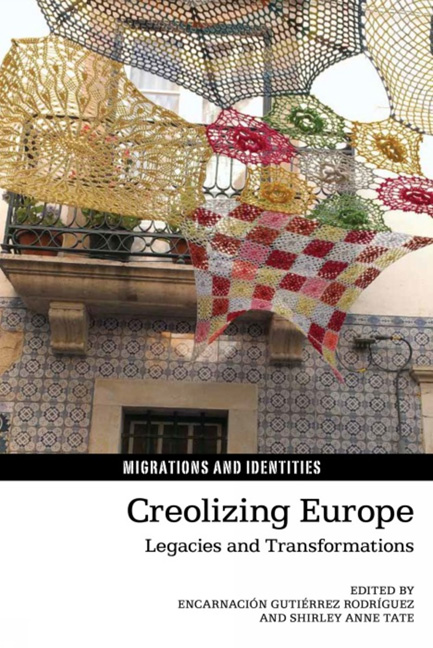Book contents
- Frontmatter
- Dedication
- Acknowledgements
- Contents
- List of Figures
- List of Contributors
- Introduction: Creolizing Europe: Legacies and Transformations
- 1 Creolité and the Process of Creolization
- 2 World Systems and the Creole, Rethought
- 3 Creolization and Resistance
- 4 Continental Creolization: French Exclusion through a Glissantian Prism
- 5 Archipelago Europe: On Creolizing Conviviality
- 6 Are We All Creoles? ‘Sable-Saffron’ Venus, Rachel Christie and Aesthetic Creolization
- 7 Re-imagining Manchester as a Queer and Haptic Brown Atlantic Space
- 8 Queering Diaspora Space, Creolizing Counter-Publics: On British South Asian Gay and Bisexual Men's Negotiations of Sexuality, Intimacy and Marriage
- 9 On Being Portuguese: Luso-tropicalism, Migrations and the Politics of Citizenship
- 10 Comics, Dolls and the Disavowal of Racism: Learning from Mexican Mestizaje
- 11 Creolizing Citizenship? Migrant Women from Turkey as Subjects of Agency
- Index
2 - World Systems and the Creole, Rethought
- Frontmatter
- Dedication
- Acknowledgements
- Contents
- List of Figures
- List of Contributors
- Introduction: Creolizing Europe: Legacies and Transformations
- 1 Creolité and the Process of Creolization
- 2 World Systems and the Creole, Rethought
- 3 Creolization and Resistance
- 4 Continental Creolization: French Exclusion through a Glissantian Prism
- 5 Archipelago Europe: On Creolizing Conviviality
- 6 Are We All Creoles? ‘Sable-Saffron’ Venus, Rachel Christie and Aesthetic Creolization
- 7 Re-imagining Manchester as a Queer and Haptic Brown Atlantic Space
- 8 Queering Diaspora Space, Creolizing Counter-Publics: On British South Asian Gay and Bisexual Men's Negotiations of Sexuality, Intimacy and Marriage
- 9 On Being Portuguese: Luso-tropicalism, Migrations and the Politics of Citizenship
- 10 Comics, Dolls and the Disavowal of Racism: Learning from Mexican Mestizaje
- 11 Creolizing Citizenship? Migrant Women from Turkey as Subjects of Agency
- Index
Summary
What follows is a proposal of creolity rather than kinship as a model for comparativist practice. The original proposal was made to Professor Wai Chi Dimock, whose paper is discussed in the body of the chapter. I am a Europeanist (as is Professor Dimock), and I was thinking of Dante and Latin when I crafted this proposal rather than Caribbean-based creolization theory. Having said that, such theory has much to tell us about Dante and Latin itself as well as how it is that a world system such as knowledge, can be altered through the insertion of the question of ‘Creolizing Europe’.
Why should these thoughts be at all useful in thinking of ‘Creolizing Europe’ today? First, because in Dante's understanding of popular Italian as varieties of Creole and his choice of an aristocratic (‘curial’) political Creole as ‘Italian’ we can situate our own project of Creolizing Europe within the beginnings of European nationalisms and nation states. Second, through literature's capacity to inaugurate an ‘experience of the impossible’ (both Freud and Derrida insisted on this, in different ways), our general discussion may give us a way of thinking outside of the requirements of activism in terms of indentitarian politics which tend towards essentialization rather than thinking and acting beyond this in terms of Glissantian creolity.
It must be a Glissantian creolity though that acknowledges the place of capital and class in any theorization as well as a particular view of imperialism. I stumbled on the idea that imperialism was an ‘enabling violation’ at least thirty years ago. Subsequent work willy-nilly located our class, now global, as the beneficiary, not only by birth, but other circumstances as well. I have never been able to think of descriptive arguments for counter- or alternative-modernities as anything but specific to this amorphous ‘class’. Globality and the creolity which this necessitates can save us if we assert that everything now is what ‘modern’ (not counter-, not alternative-) is, and live up to the task of disciplinary revision. This task is not an easy or straightforward one but we must remember that not every ‘European’ invented the steam engine, not every ‘American’ the telephone.
- Type
- Chapter
- Information
- Creolizing EuropeLegacies and Transformations, pp. 26 - 37Publisher: Liverpool University PressPrint publication year: 2015



